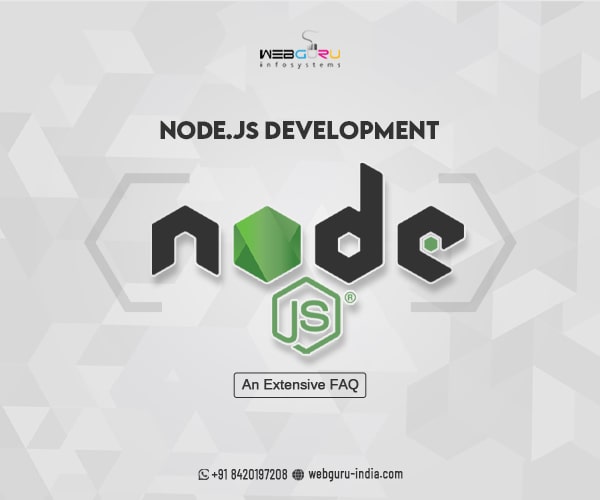Home Blog Web Application Development Node.js Development – An Extensive FAQ
Node.js Development – An Extensive FAQ
- 03 Oct / 2020
- 3,964 views

One of the most crucial questions you will come across while developing a web application is which technology to choose! The tech stack you pick will greatly influence your app. Node.js is undoubtedly the king of backend development and you may have heard this name quite often. With leading companies like Netflix, Walmart, PayPal or LinkedIn in its client list, Node.js sure has something unique to bring to the table.
With the huge craze of Node.js in the industry, you must want to know the details of this technology? Relax, we’ll address all your concerns below. We have brought our in-house development team together to find answers to all the frequently asked questions about Node.js. Dive in, it’s totally worth your time!
1. What is Node.js?
Node.js is a cross-platform and open source JavaScript runtime environment. It is based on Chrome’s V8 JS runtime engine that can convert JS codes into low-level machine codes. Its main purpose is to develop scalable web applications. Node.js is blazing fast and has proven to be ideal for developing apps for IoT devices, gaming, video streaming, generic, network-based and real-time web applications.
2. Architectures of Node.js
Node.js architecture includes the following:
Event loop – It allows Node.js to execute non-blocking I/O (input-output) operations. Any transaction passing through it traverses callbacks. Using the libuv library, Node.js can handle queuing and process any asynchronous event.
Single threaded – Node works on a single thread. This approach helps in avoiding context switching.
Non-blocking I/O – This loop is based on single thread, however, the runtime tasks are performed in an asynchronous manner that returns the result through call back to the event loop thread.
Back end development – This part is not visible to the application users. It deals with the server side scripting along with database integration so as to receive and return requested data from the front end.
3. Features of Node.js
Robust single codebase – Node.js has proved to be a game changer as it allows the developers to code JavaScript both on the server and client sides. This makes it extremely easy to send and synchronize data between two points almost instantly – thereby saving significant development time.
Cross-platform development – Node.js collaboration with NW.js or Electron enables the devs to create user-friendly cross-platform apps.
Ideal for microservices – Node has the capability to optimize the performance of any application. It also eliminates the unwieldy modules to make it simple to operate microservices on apps.
High performance – The single threaded JS runtime supports seamlessly performing applications. Built upon Chrome’s V8 runtime engine and coded in C++, Node is especially built for diverse operating systems. It is also updated at regular intervals with security patches and performance optimizations.
Data streaming – Usually, HTTP requests responses are considered to be isolated events. However, these basically are streaming data. You may leverage this data streaming in Node by including features such as processing files while uploading. It also reduces the entire processing time.
Real time application – Node.js is ideal for developing real-time apps like gaming and chatting apps. It is also ideal for programmes which demand a non-blocking or event-based server.
Scalable and lightweight – Node.js enhances development time without compromising security terms or quality. Further, the non-blocking feature of the threads ensures that the apps are scalable, lightweight, and behave in a network-friendly way.
Encourage sharing – NPM or Node Package Manger encourages sharing. Equipped with a robust repository of around 50,000 packages, the developers can build effective solutions. With built-in NPM, it’s easy for the developers to share, update, and reuse codes.
4. What are its benefits?
Blazing fast – The event-driven architecture of Node.js makes it a really fast tech stack. Instead of creating distinct threads for every request or waiting for one request to complete before starting another, Node.js can process multiple requests simultaneously.
Saves time, efforts, and cost – Node.js is equipped with a vast repository of library – the NPM (Node Package Manager). The developers can reuse the modules across the code and bring diverse functionalities into any application. The open-source repository significantly reduces development cost and efforts and also shortens the deployment time all the while driving innovative solutions.
One language – One of the major benefits of Node.js is that it advances the writing of the entire infrastructure of any web application in one language – JavaScript. Naturally, this reduces the learning curve of the developers.
Lower hiring costs – Full-stack JS development demands fewer developers as the team can efficiently navigate through the JS environment, manage the codes and expand it as per requirement. Thereby, Node.js development services won’t cost you too much.
Powerful community support – Node.js has a strong industry backing and community support. So the developers can seek assistance from the experts from all around the world. This advances the development projects.
Due to all these benefits, Node.js is the perfect choice for enterprise-level applications.
5. What are the drawbacks of Node.js?
Callback hell – Callback hell is a consequence when there’re heavily nested callbacks. Let’s explain this for your better understanding. Node is asynchronous and it can execute simultaneous requests without relying on the completion of other tasks. In order to maintain Node’s non-blocking nature, functions with callbacks need to be written in the code. This may result in callback hell where one set of callbacks are placed inside other callbacks. This results in codes that are difficult to decipher and manage.
However, according to the experienced developers, callback-hell is not necessarily a downside of Node.js. Rather, it’s a sign of a lack of understanding of the JS paradigm, where cods are executed asynchronously instead of line by line.
Here are three main ways to fix callbacks:
- The codes need to be kept narrow
- Every single error should be taken care of separately
- Split the callbacks into minor functionalities (known as parameters). These can later be joined together to derive the desired functionality.
To avoid the issue of Callback hell, JavaScript itself provides two features – Promise and Async Await. A pending promise can either be fulfilled with a value (Resolve) or fail with a reason or error (Reject). Thus it enables you to associate handles with the eventual success value or failure reason of an asynchronous action.
Not recommended for CPU-heavy tasks – Node.js is an ideal choice for real-time apps but not for the operations that are heavy on the CPU. Those operations are better to be written in other programming languages like PHP, Python, or Ruby.
Node is not recommended for any CPU-heavy tasks since once a resource-demanding request enters into the event loop, it can prevent responding to other requests until that one request is finished.
6. What are Node.js modules?
Node.js modules are the libraries and codes that the devs can use to carry out their projects. In fact, these modules make Node.js a wonderful choice for an efficient app development.
7. Which kinds of applications are built with it?
From startups to enterprises – businesses of varied sizes rely on Node.js once it comes to developing a stable and scalable web application. Due to its event-driven nature, Node.js excels over other frameworks.
You can develop the following types of web applications with Node.js:
- Project management apps
- Social media apps
- Gaming apps
- Live streaming video apps
- Discussion or chat forums
- IoT applications
8. Can we use Node.js for serverless and microservices?
Microservice architecture denotes the development of an app made of distinct services. Each service is responsible for carrying out different tasks. The codebase can be increased as per your business requirement. Further, the parts of the code can be built in diverse programming languages and it offers you greater control over the functionality and app performance. Therefore, it ensures a scalable app development and allows you to add various functionalities while dealing with a larger monolithic core.
Yet another significant aspect of Node.js is its serverless architecture. It denotes a situation where the developers get rid of managing servers and using functions while writing codes. This enables them to deploy any code or function individually. Overall, the cost is lower than handling a standard infrastructure.
9. Is Node.js good for MVPs and prototyping?
Since Node is equipped with a large repository of modules in the NPM, developers can easily prototype and craft MVPs (Minimum Viable Products) really fast. This is desirable for the entrepreneurs as they can launch an MVP in the market to win a competitive edge and then go on to scale the application as per requirement and budget.
10. Which database to use for Node.js?
Node.js can work efficiently with any database – both SQL ones like PostgreSQL or NoSQL like MongoDB.
11. Which hosting service to pick for a Node.js built application?
Node.js is often considered as hosting agnostic. That means, it can run easily on any server provider including Google Cloud, Azure, and Amazon Web Service. However, according to a study by Stack Overflow, most of the Node.js based applications are hosted on AWS.
12. How to find Node.js developers for your project?
Hit a search with Node.js developers and you will be flooded with results. As one of the most demanded tech-stack, Node.js has no scarcity of developers. However, you need to pay attention to the efficiency, experience, industry-exposure, and past work samples of the team before engaging reliable and professional web application development services.
13. How to scale Node.js application?
Any Node.js based app can be scaled vertically and horizontally. The cluster module of Node is extremely helpful in this regard. In case of the horizontal scaling, it works akin to any other usual backend application.
14. What is middleware in Node.js?
Middleware is a function which receives any request and also the response objects. Some of the tasks executed by middleware are as follow:
- Modify the request and the response objects
- Execute any type of code
- Accomplish the request-response cycle
- Tag the next middleware in the stack to carry on the request-response cycle
15. What are the Most Commonly Used Libraries in Node.js?
Though there are numerous modules in Node.js, two most famous ones are:
Mongoose – this is a Node.js web app framework that makes it easy to connect the application with a database.
Express.js – This is also a flexible Node.js based web application framework which offers a wide suite of features to develop web and mobile apps.
16. What is the Future of Node.js?
Node.js ensures that JavaScript is omnipresent in both the server and browser. The stable solution has proved its worth in IoT (Internet of Things). Further, this technology is a favourite pick for most of the developers across the world for the backend systems of web apps. It denotes a bright future of Node.js and we can conclude that this programming language is here to stay!
Wrapping Up
We hope you have got a wholesome idea about Node.js? If you still have any query, feel free to ask our developers.

Surajit Das
Surajit Das has vast experience in web app development. His expertise in various programming languages & frameworks is reflected in the blogs.
2 comments
Leave a Reply

-
1000+
Happy
Clients -
25+
Countries
Served -
19+
Years of
Trust








awesome ! Thanks for sharing. I appreciate.
A great piece that sheds much needed light on merging technology and its impact on business as there are many new details you posted here. Sometimes it is not so easy to build a “Website Application Development” without custom knowledge; here you need proper development skills and experience. However, the details you mention here would be very much helpful for the beginner.